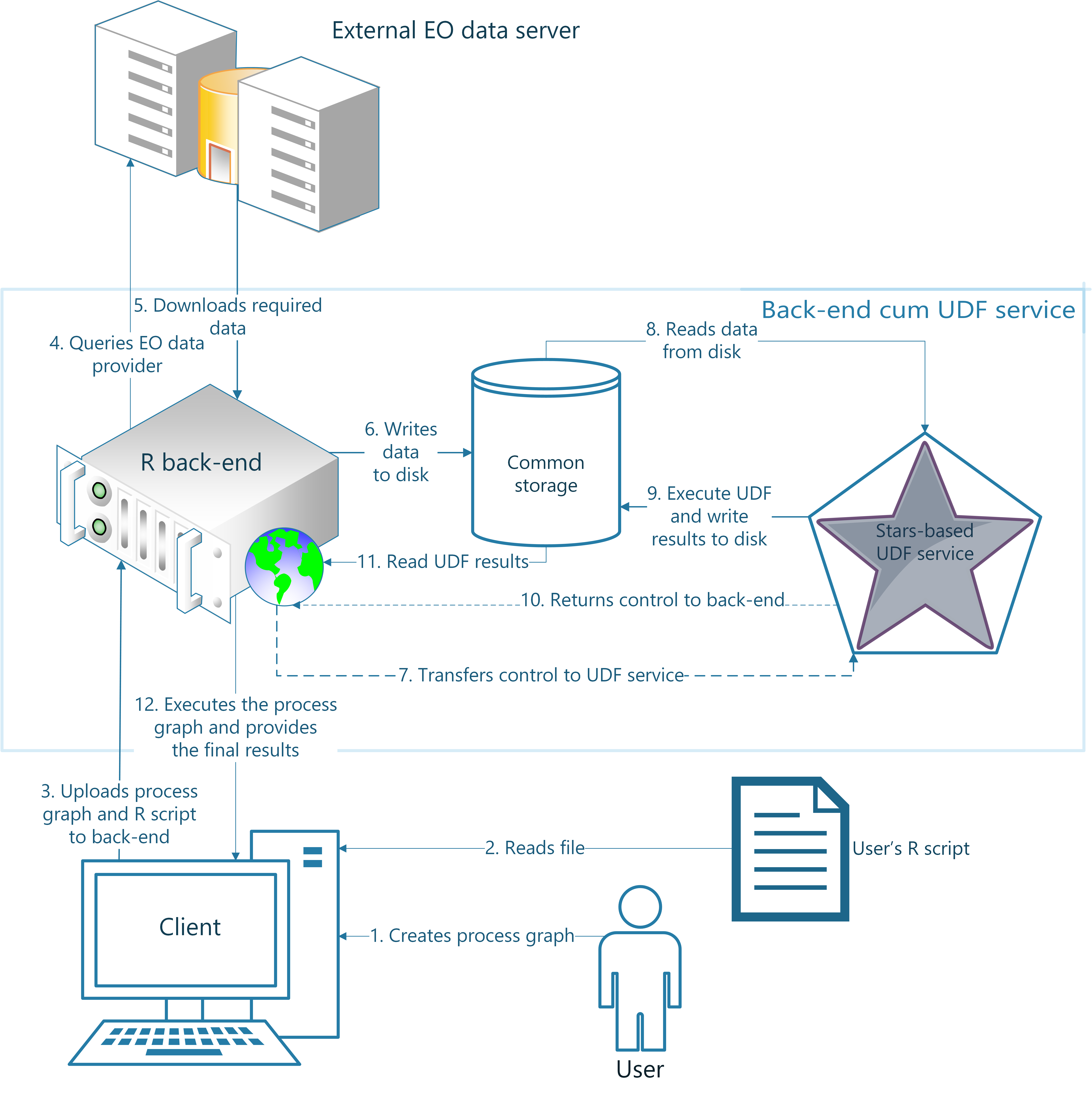File-based UDF service (Strategy 1)
Pramit Ghosh
2019-04-05
Source:vignettes/file-based.Rmd
file-based.RmdIntroducing the file-based R UDF service
Background
The file-based R UDF service works on the concept that it is possible to have a common storage space which is accessible feasibly by both the backends as well as the R UDF service. Then, when a UDF is encountered in the process graph by the backend, it writes the intermediate results to that disk in the form of generic GeoTIFF files along with a look-up table (in the form of a CSV file) which contains information on which file corresponds to which time-step and band along with some redundant information such as their spatial and temporal extents. Control is transferred to the user’s UDF script file which would then
load this library using
define his/her custom function
and pass the function name as an argument to the function run_UDF() which is defined in the package openEO.R.UDF. Here obj is a list of numbers obtained from using st_apply() on a stars object with a MAR argument to define the dimension the function is to be applied on. For example,
Here, legend_name refers to the name of the look-up table and drop_dim refers to the dimension the function is to be applied over. drop_dim = 3 refers to the dimension for band while drop_dim = 4 refers to time.
Corresponding R “backend”
This release shows the use of User Defined Functions (UDFs) in R in the context of the OpenEO project. OpenEO.R.UDF is a R package and currently integrates with the “backend” implementation by @flahn in R here: https://github.com/Open-EO/openeo-r-backend/.
Code for demo
Working example:
- Install required packages Install the packages “openeo-r-backend”, “openeo” and “openEO.R.UDF”
library(devtools)
install_github("Open-EO/openeo-r-backend", ref = "feature/udf_develop")
install_github("Open-EO/openeo-r-client")
install_github("pramitghosh/OpenEO.R.UDF")- Start the backend server and load demo data
library(openEO.R.Backend)
createServerInstance()
openeo.server$workspaces.path = "<path/to/workspace/directory here>"
openeo.server$initEnvironmentDefault()
openeo.server$initializeDatabase()
# Creating a user for the first time...
# openeo.server$createUser(user_name = "<username here>", password = "<password here>")
openeo.server$loadDemo() #Loads demo data
openeo.server$startup(port = 8000) #Starts up local server on port 8000- Login and execute process using the R client
library(openeo)
conn = connect(host = "http://127.0.0.1:8000/api/", user = "<registered username here>", password = "<password here>", rbackend = T) #Login using credentials
conn %>% listProcesses() #Should show a list of available processes including `aggregate_time`
# Upload UDF script file in R to the server from the local working directory
# (e.g. <https://github.com/pramitghosh/OpenEO.R.UDF/blob/master/data/example_udf/sample_udf.R>)
uploadUserData(conn, content = "../backend/sample_udf.R", target = "/script.R")
#Check to make sure the file "script.R" is listed to be present on the server
conn %>% listFiles()
# Create process graph starting with
# Sentinel-2 data -> Temporal filtering -> Applying UDF of type `aggregate_time` to find the median along the time axis for all the 13 bands
task = collection("sentinel2_subset", id_name = "product_id") %>%
process(process_id = "filter_daterange", prior.name = "imagery", from = "2017-05-01", to = "2017-06-20") %>%
process(process_id = "aggregate_time", prior.name = "imagery", script = "/script.R")
conn %>% executeTask(task = task, format = "GTiff", output_file = "out.tif") #Executes the process graphThe output file is to be found in the workspace directory that was defined. The end of processing could be observed when the message “Task result was sucessfully stored.” appears on the console running the client.
